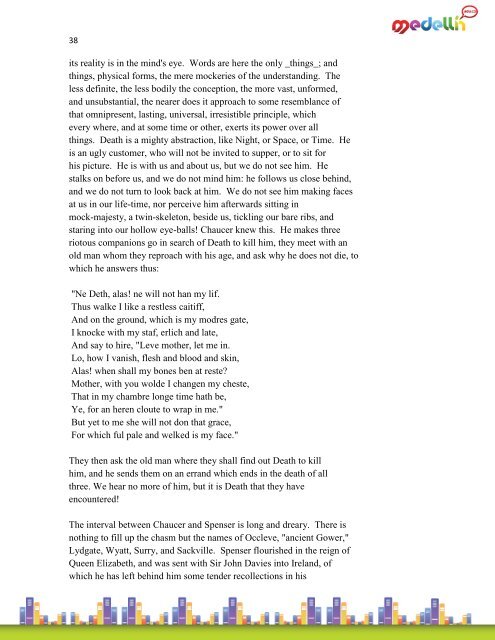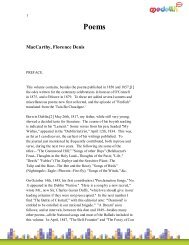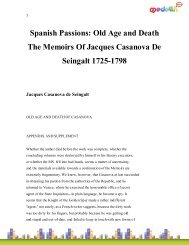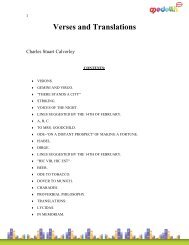Lectures On The English Poets William Hazlitt
Lectures On The English Poets William Hazlitt
Lectures On The English Poets William Hazlitt
Create successful ePaper yourself
Turn your PDF publications into a flip-book with our unique Google optimized e-Paper software.
38<br />
its reality is in the mind's eye. Words are here the only _things_; and<br />
things, physical forms, the mere mockeries of the understanding. <strong>The</strong><br />
less definite, the less bodily the conception, the more vast, unformed,<br />
and unsubstantial, the nearer does it approach to some resemblance of<br />
that omnipresent, lasting, universal, irresistible principle, which<br />
every where, and at some time or other, exerts its power over all<br />
things. Death is a mighty abstraction, like Night, or Space, or Time. He<br />
is an ugly customer, who will not be invited to supper, or to sit for<br />
his picture. He is with us and about us, but we do not see him. He<br />
stalks on before us, and we do not mind him: he follows us close behind,<br />
and we do not turn to look back at him. We do not see him making faces<br />
at us in our life-time, nor perceive him afterwards sitting in<br />
mock-majesty, a twin-skeleton, beside us, tickling our bare ribs, and<br />
staring into our hollow eye-balls! Chaucer knew this. He makes three<br />
riotous companions go in search of Death to kill him, they meet with an<br />
old man whom they reproach with his age, and ask why he does not die, to<br />
which he answers thus:<br />
"Ne Deth, alas! ne will not han my lif.<br />
Thus walke I like a restless caitiff,<br />
And on the ground, which is my modres gate,<br />
I knocke with my staf, erlich and late,<br />
And say to hire, "Leve mother, let me in.<br />
Lo, how I vanish, flesh and blood and skin,<br />
Alas! when shall my bones ben at reste?<br />
Mother, with you wolde I changen my cheste,<br />
That in my chambre longe time hath be,<br />
Ye, for an heren cloute to wrap in me."<br />
But yet to me she will not don that grace,<br />
For which ful pale and welked is my face."<br />
<strong>The</strong>y then ask the old man where they shall find out Death to kill<br />
him, and he sends them on an errand which ends in the death of all<br />
three. We hear no more of him, but it is Death that they have<br />
encountered!<br />
<strong>The</strong> interval between Chaucer and Spenser is long and dreary. <strong>The</strong>re is<br />
nothing to fill up the chasm but the names of Occleve, "ancient Gower,"<br />
Lydgate, Wyatt, Surry, and Sackville. Spenser flourished in the reign of<br />
Queen Elizabeth, and was sent with Sir John Davies into Ireland, of<br />
which he has left behind him some tender recollections in his

















